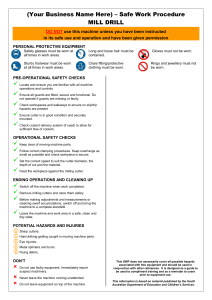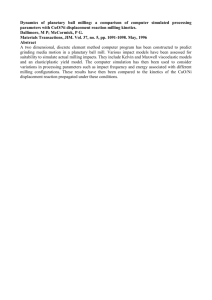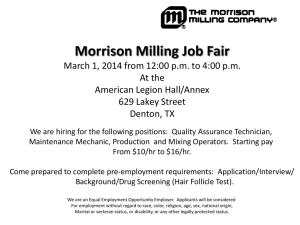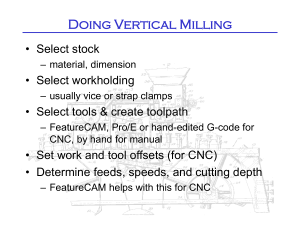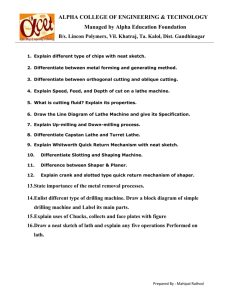Milling-Cutter
advertisement
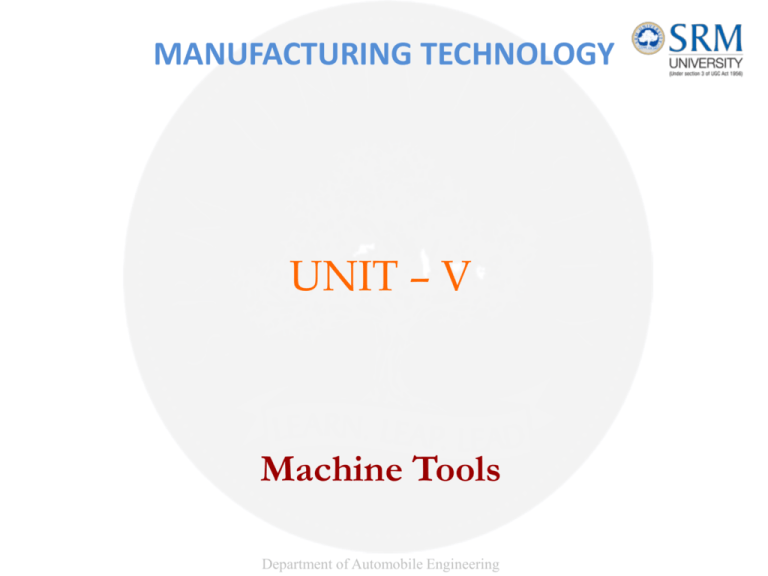
MANUFACTURING TECHNOLOGY UNIT – V Machine Tools Department of Automobile Engineering Manufacturing Technology Milling cutters Classification of milling cutters according to their design • HSS cutters: Many cutters like end mills, slitting cutters, slab cutters, angular cutters, form cutters, etc., are made from high-speed steel (HSS). • Brazed cutters: Very limited number of cutters (mainly face mills) are made with brazed carbide inserts. This design is largely replaced by mechanically attached cutters. • Mechanically attached cutters: The vast majority of cutters are in this category. Carbide inserts are either clamped or pin locked to the body of the milling cutter. Department of Automobile Engineering Manufacturing Technology Milling Cutter Nomenclature Department of Automobile Engineering Manufacturing Technology Milling Cutter Nomenclature • The pitch refers to the angular distance between like or adjacent teeth. • The pitch is determined by the number of teeth. The tooth face is the forward facing surface of the tooth that forms the cutting edge. • The cutting edge is the angle on each tooth that performs the cutting. • The land is the narrow surface behind the cutting edge on each tooth. • The rake angle is the angle formed between the face of the tooth and the centerline of the cutter. The rake angle defines the cutting edge and provides a path for chips that are cut from the workpiece. • The primary clearance angle is the angle of the land of each tooth measured from a line tangent to the centerline of the cutter at the cutting edge. This angle prevents each tooth from rubbing against the workpiece after it makes its cut. Department of Automobile Engineering Manufacturing Technology Milling Cutter Nomenclature • This angle defines the land of each tooth and provides additional clearance for passage of cutting oil and chips. • The hole diameter determines the size of the arbor necessary to mount the milling cutter. • Plain milling cutters that are more than 3/4 inch in width are usually made with spiral or helical teeth. A plain spiral-tooth milling cutter produces a better and smoother finish and requires less power to operate. A plain helicaltooth milling cutter is especially desirable when milling an uneven surface or one with holes in it. Department of Automobile Engineering Manufacturing Technology Classification of milling cutters associated with the various milling operations Profile sharpened cutters • surfaces are not related with the tool shape – Slab or plain milling cutter : straight or helical fluted – Side milling cutters – single side or both sided type – Slotting cutter – Slitting or parting tools – End milling cutters – with straight or taper shank – Face milling cutters Department of Automobile Engineering Manufacturing Technology Form relieved cutters • Where the job profile becomes the replica of the tool-form – Form cutters – Gear (teeth) milling cutters – Spline shaft cutters – Tool form cutters – T-slot cutters – Thread milling cutter Department of Automobile Engineering Manufacturing Technology Profile sharpened cutters • The profile sharpened cutters are inherently used for making flat surfaces or surface bounded by a number of flat surfaces only. Slab or Plain milling cutters • Plain milling cutters are hollow straight HSS cylinder of 40 to 80 mm outer diameter having 4 to 16 straight or helical equi-spaced flutes or cutting edges and are used in horizontal arbour to machine flat surface Machining flat surface by slab milling Cutter Department of Automobile Engineering Manufacturing Technology Side and slot milling cutters • These arbour mounted disc type cutters have a large number of cutting teeth at equal spacing on the periphery. Side milling cutters Department of Automobile Engineering Manufacturing Technology End milling cutters • The end milling cutter, also called an end mill, has teeth on the end as well as the periphery Department of Automobile Engineering Manufacturing Technology Face milling cutter Department of Automobile Engineering Manufacturing Technology Form relieved cutters • Form of the tool is exactly replica of the job-profile to be made • Clearance or flank surfaces of the teeth are spiral shaped instead of flat • Used for making 2-D and 3-D contour surfaces Department of Automobile Engineering Manufacturing Technology T-slot & Gear milling cutters Department of Automobile Engineering Manufacturing Technology Thread milling cutter Department of Automobile Engineering Manufacturing Technology Indexing • Indexing is the process of evenly dividing the circumference of a circular work piece into equally spaced divisions, such as in cutting gear teeth, cutting splines, milling grooves in reamers and taps, and spacing holes on a circle. • The index head of the indexing fixture is used for this purpose. Department of Automobile Engineering Manufacturing Technology Index Head • The index head of the indexing fixture (Figure ) contains an indexing mechanism which is used to control the rotation of the index head spindle to space or divide a work piece accurately. A simple indexing mechanism consists of a 40-tooth worm wheel fastened to the index head spindle, a single-cut worm, a crank for turning the worm shaft, and an index plate and sector. Since there are 40 teeth in the worm wheel, one turn of the index crank causes the worm, and consequently, the index head spindle to make 1/40 of a turn; so 40 turns of the index crank revolve the spindle one full turn. Department of Automobile Engineering Manufacturing Technology Index Plate • The indexing plate (Figure) is a round plate with a series of six or more circles of equally spaced holes; the index pin on the crank can be inserted in any hole in any circle. With the interchangeable plates regularly furnished with most index heads, the spacing necessary for most gears, bolt heads, milling cutters, splines, and so forth can be obtained. Sector • The sector (Figure) indicates the next hole in which the pin is to be inserted and makes it unnecessary to count holes when moving the index crank after each cut. It consists of two radial, beveled arms which can be set at any angle to each other and then moved together around the center of the index plate. Department of Automobile Engineering Manufacturing Technology Index Plate Types • Brown and Sharpe type consists of 3 plates of 6 circles each drilled as follows: – Plate I - 15, 16, 17, 18, 19, 20 holes – Plate 2 - 21, 23, 27, 29, 31, 33 holes – Plate 3 - 37, 39, 41, 43, 47, 49 holes • Cincinnati type consists of one plate drilled on both sides with circles divided as follows: – First side - 24, 25, 28, 30, 34, 37, 38, 39, 41, 42, 43 holes – Second side - 46, 47, 49, 51, 53, 54, 57, 58, 59, 62, 66 holes Department of Automobile Engineering Manufacturing Technology Indexing Methods Simple Indexing or Plain Indexing • In simple or plain indexing, an index plate selected for the particular application, is fitted on the worm shaft and locked through a locking pin’ • To index the work through any required angle, the index crank pin is withdrawn from the hole of the index plate than the work is indexed through the required angle by turning the index crank through a calculated number of whole revolutions and holes on one of the hole circles, after which the index pin is relocated in the required hole • If the number of turns that the crank must be rotated for each indexing can be found from the formula – N = 40 / Z – Where – Z - No of divisions or indexings needed on the work – 40 – No of teeth on the worm wheel attached to the indexing plate, since 40 turns of the index crank will turn the spindle to one full turn Department of Automobile Engineering Manufacturing Technology • Suppose it is desired to mill a gear with eight equally spaced teeth. l/8th of 40 or 5 turns (Since 40 turns of the index crank will turn the spindle one full turn) of the crank after each cut, will space the gear for 8 teeth. If it is desired to space equally for 10 teeth, 1/10 of 40 or 4 turns would produce the correct spacing. • The same principle applies whether or not the divisions required divide equally into 40. For example, if it is desired to index for 16 divisions, 16 divided into 40 equals 2 8/16 turns. i.e for each indexing we need two complete rotations of the crank plus 8 more holes on the 16 hole circle of plate 1(Plate I - 15, 16, 17, 18, 19, 20 holes) Department of Automobile Engineering Manufacturing Technology Direct Indexing • In direct indexing, the index plate is directly mounted on the dividing head spindle ( no worm shaft or wheel) • While indexing, the index crank pin is withdrawn from the hole of the index plate than the pin is engaged directly after the work and the indexing plate are rotated to the desire number of holes • In this method fractions of a complete turn of the spindle are limited to those available with the index plate • Direct indexing is accomplished by an additional index plate fastened to the index head spindle. A stationary plunger in the index head fits the holes in this index plate. By moving this plate by hand to index directly, the spindle and the work piece rotate an equal distance. Direct index plates usually have 24 holes and offer a quick means of milling squares, hexagons, taps, and so forth. Any number of divisions which is a factor of 24 can be indexed quickly and conveniently by the direct indexing method. Department of Automobile Engineering Manufacturing Technology Differential Indexing • Sometimes, a number of divisions is required which cannot be obtained by simple indexing with the index plates regularly supplied. To obtain these divisions, a differential index head is used. The index crank is connected to the worm shaft by a train of gears instead of a direct coupling as with simple indexing. The selection of these gears involves calculations similar to those used in calculating change gear ratio for lathe thread cutting. • Gear Ratio I = 40/K ( K – Z) Where – K – a number very nearly equal to Z – For example if the value of Z is 53, the value of K is 50 Department of Automobile Engineering Manufacturing Technology Indexing in Degrees • Work pieces can be indexed in degrees as well as fractions of a turn with the usual index head. There are 360 degrees in a complete circle and one turn of the index crank revolves the spindle 1/40 or 9 degrees. Therefore, 1/9 turn of the crank rotates the spindle 1 degree. Work pieces can therefore be indexed in degrees by using a circle of holes divisible by 9. For example, moving the crank 2 spaces on an 18-hole circle, 3 spaces on a 27-hole circle, or 4 spaces on a 36-hole circle will rotate the spindle 1 degree. • Smaller crank movements further subdivide the circle: moving 1 space on an 18-hole circle turns the spindle 1/2 degree (30 minutes), 1 space on a 27-hole circle turns the spindle 1/3 degree (20 minutes), and so forth. Department of Automobile Engineering Manufacturing Technology Indexing in Degrees • Work pieces can be indexed in degrees as well as fractions of a turn with the usual index head. There are 360 degrees in a complete circle and one turn of the index crank revolves the spindle 1/40 or 9 degrees. Therefore, 1/9 turn of the crank rotates the spindle 1 degree. Work pieces can therefore be indexed in degrees by using a circle of holes divisible by 9. For example, moving the crank 2 spaces on an 18-hole circle, 3 spaces on a 27-hole circle, or 4 spaces on a 36-hole circle will rotate the spindle 1 degree. • Smaller crank movements further subdivide the circle: moving 1 space on an 18-hole circle turns the spindle 1/2 degree (30 minutes), 1 space on a 27-hole circle turns the spindle 1/3 degree (20 minutes), and so forth. Department of Automobile Engineering Manufacturing Technology Indexing Problems • Refer P.C. Sharma –Vol-II, Page No 157 to 162 Department of Automobile Engineering
